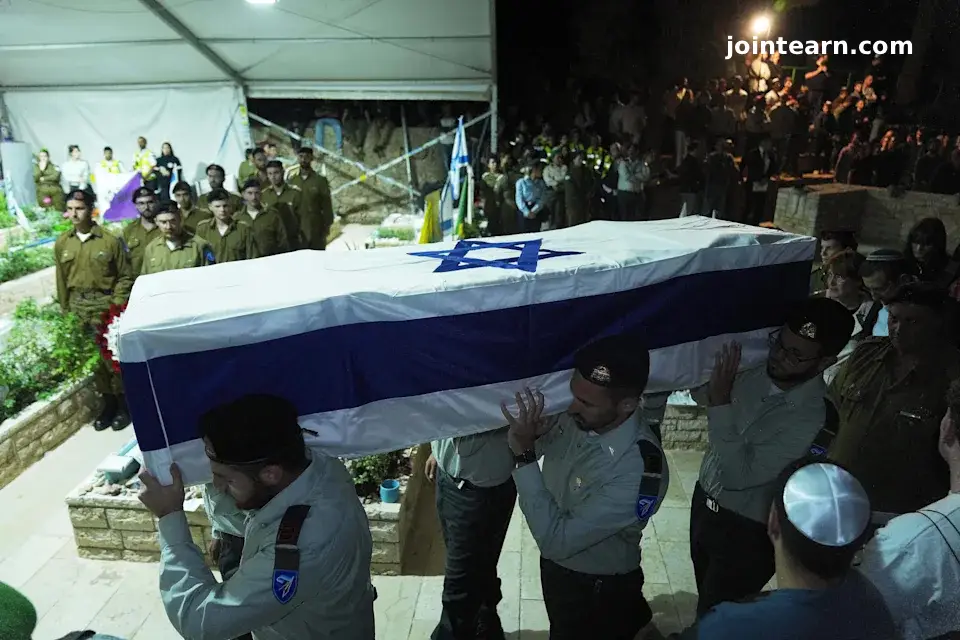
In a deeply emotional scene at Jerusalem’s Mount Herzl military cemetery, a recently freed Israeli hostage, Matan Angrest, stood beside the coffin of his fallen commander, Captain Daniel Peretz, whose body was among the few returned from Gaza this week as part of the fragile Israel–Hamas ceasefire agreement.
Angrest, 22, who was released just two days earlier after being held captive in Gaza for more than two years, bowed his head before Peretz’s grave, surrounded by hundreds of mourners, soldiers, and families still waiting for word about loved ones.
“It’s the least I can do for Daniel and for the team that fought with me,” Angrest said softly, visibly weakened but resolute. “I’m sure they’re still guarding me from heaven.”
Angrest, Peretz, and Sergeant Itay Chen had been serving together on a tank crew when Hamas-led militants stormed southern Israel on October 7, 2023, killing 1,200 Israelis and taking 251 hostages into Gaza — an attack that changed the nation’s history.
Few Bodies Returned Under Ceasefire
Under the current ceasefire terms, Hamas agreed to return the bodies of 28 deceased hostages, but as of early Thursday, only 10 remains had been handed over, one of which was later determined not to belong to a hostage.
The partial handover has left many families in anguish, still unable to hold funerals or complete traditional Jewish burial rites that provide spiritual closure.
“This is our obligation to God,” said Rabbi Benny Lau, a close friend of the Peretz family. “The soul belongs to God and returns to Him, but the body is our responsibility — we must return it to the land.”
The Spiritual and Emotional Weight of Burial
For many Israeli families, the inability to recover their loved ones’ remains adds unbearable pain to already devastating loss. In Judaism, as in Islam, the burial of the body — whole and swiftly — is considered sacred, ensuring that the soul can find peace.
Sharon Laufer, a volunteer with Jewish burial societies and an army reserve member who prepares fallen soldiers for burial, said the process is both religious and psychological.
“Until the body is put in the ground, the soul is not complete,” Laufer explained. “That’s why it’s so important to us — it’s part of healing for both the living and the dead.”
In normal times, funerals in Israel take place within a day of death. But after two years of captivity and uncertainty, each repatriated body now represents both closure and heartbreak for a nation still reeling.
Families in Limbo: “We Can’t Close This Chapter”
While Israel celebrated the release of surviving hostages earlier this week, other families felt forgotten — their agony renewed by the absence of news.
“We cannot close this chapter of these two years without returning all of them,” said Rabbi Lau.
Among those still waiting is the family of Sgt. Itay Chen, 19, who was abducted on October 7 after swapping shifts so he could attend his brother’s bar mitzvah. His father, Ruby Chen, described living with constant dread and uncertainty.
“You start the day expecting the worst phone call of your life — and then feel disappointed when it doesn’t come,” he said.
Nearby, in Tel Aviv, hundreds gathered on bridges and streets to honor Guy Illouz, another hostage taken from the Nova music festival, who was also laid to rest Wednesday.
“I fought for them to come home,” said Shlomit Grouda, a mourner waving an Israeli flag. “I was happy for those who returned alive, but now we must bow our heads for those who didn’t.”
A Widow’s Waiting: “He Deserves to Be Buried Here”
In Nir Yitzhak, widow Ela Haimi keeps vigil for her husband, Tal Haimi, 41, who was killed defending their kibbutz on October 7. His phone last pinged in Khan Younis, Gaza, where his body is believed to remain.
Ela, who returned home this summer with her three children — including one born seven months after Tal’s death — said she is still waiting for his remains to come home.
“He deserves this honor,” she said quietly. “He went out first, knowing I was alone with the kids among terrorists — to protect us. And he did.”
Ela held a funeral in 2023, observing the seven-day shiva mourning period, but the grave only contains Tal’s helmet.
“The kids know he left,” she said. “They just don’t know where he is.”
Mourning as a Path to Healing
Religious and mental health experts agree that the act of burial is vital for the living as much as for the dead.
“We need to give families the ability to move from uncertainty to reality — from hoping to healing,” said Rabbi Mijael Even David of Be’er Sheva, who has presided over dozens of funerals for both soldiers and civilians killed in the war.
Judaism prescribes a series of mourning stages — from shiva (seven days) to shloshim (thirty days) — that help mourners gradually reenter daily life.
Dr. Einat Yehene, a rehabilitation psychologist with the Hostages Families Forum, says the absence of remains can cause “traumatic grief,” preventing families and the nation from healing.
“Only when all the hostages are back can Israel truly begin to recover,” she said.
“You Can Finally Rest in the Holy Land”
At the end of the three-hour funeral, Adina Peretz, Daniel’s sister, delivered a eulogy that moved the crowd to tears.
“Standing here brings more pain than I ever thought possible,” she said. “But there’s peace, too. You can finally rest in the Holy Land.”
As the service closed, President Isaac Herzog stood beside Daniel’s mother, Shelley Peretz, who noted that her son had returned home on the same Jewish holiday — Simchat Torah — as the day he was abducted two years earlier.
“We have you home now, where you belong,” she said as a gun salute echoed across Mount Herzl Cemetery.


Leave a Reply